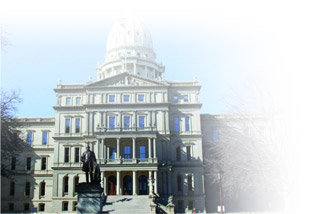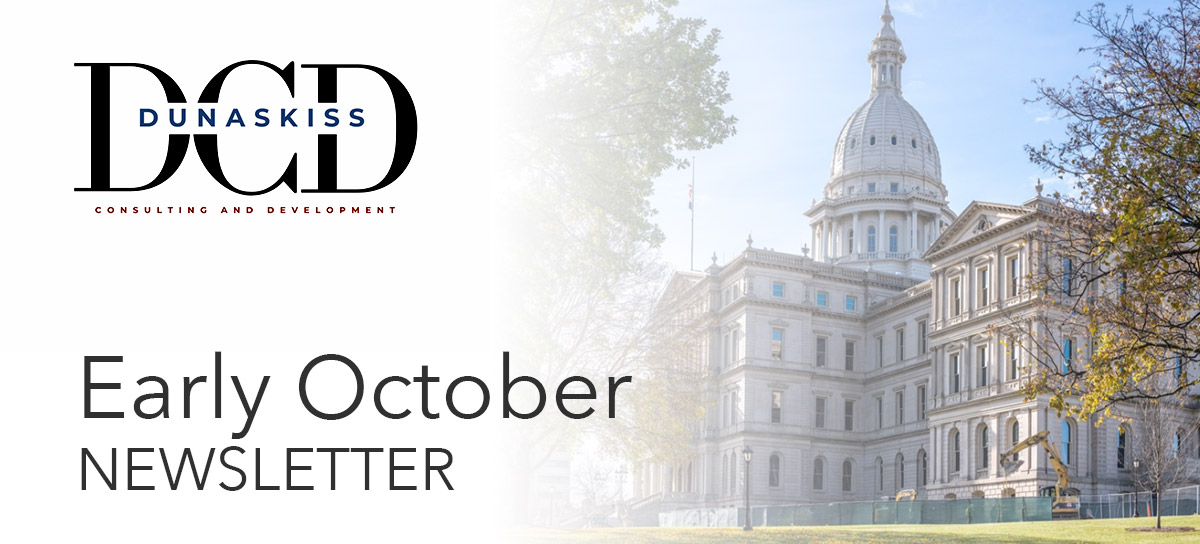
|
|||||||
|
Flat, reduced revenue sharing draws some disappointment from locals in wake of roads deal Local government groups had a mixed reaction to the Legislature's moves in the new fiscal year budget to reduce or maintain flat levels of traditional revenue sharing as part of its plan to redirect sales tax money generated at the pump toward roads as part of a long-term road funding plan. Although the road funding plan will provide additional funding to communities and local road departments to upgrade infrastructure, the resulting flat or slightly reduced revenue sharing prompted a negative to wait-and-see attitude from local government organizations. Judy Allen, government relations director with the Michigan Townships Association, in a Friday statement, said the changes made to the sales tax revenue at the gas pump to attain a road funding deal and the effect on revenue sharing is a negative for townships. "MTA is greatly disappointed that townships and other local units of government were not held harmless for the loss of sales tax revenue due to the redirect at the pump given the previous commitment of House and the governor to do so," Allen said. "The resulting constitutional revenue sharing cuts mean some communities may be forced to reduce programs and services or ask their residents for local tax increases." Early Friday morning, final votes were taken on a budget totaling $75.9 billion with another $9.3 billion in contingency funds (See Gongwer Michigan Report, October 2, 2025). Among the many moving parts to combine a road funding plan with the fiscal year 2025-26 budget was HB 4951 , which will enact a 24% wholesale tax on cannabis (See Gongwer Michigan Report, October 2, 2025). Additional legislation, HB 4180 , HB 4181 , HB 4182 and HB 4183 , will implement a fuel tax swap, redirecting all revenues generated at the pump to roads while seeking to backfill the money historically provided to other areas, most notably schools. The changes collectively redirect funding to roads, leaving locals to take a slight hit elsewhere through traditional revenue sharing. Constitutional revenue sharing, as a result, is set at $1.01 billion for the new fiscal year. That's a reduction of $63.6 million from the previous fiscal year. Statutory revenue sharing to cities, villages and townships will remain at the same level as the previous fiscal year ($333.5 million), as will revenue sharing to counties ($291.1 million). The passed budget also included $50 million in public safety revenue sharing grants and an additional $20 million in one-time grants for public safety. John LaMacchia, director of state and federal affairs for the Michigan Municipal League, said on Friday the group was still reviewing the budget to determine the potential effects the revenue sharing portion will have on local governments. He took a more reserved stance on what the Legislature achieved. "When you intertwine roads and revenue sharing and public safety, every one of our members is going to see a different effect," LaMacchia said. While cities get money directly from the state for roads, townships do not. Counties handle roads within townships. LaMacchia said there is no doubt communities are going to see a noticeable increase in road funding, but the net effect may be less money overall. "It's not one-for-one," LaMacchia said. He said MML is grateful that the state was able to tackle a problem that has plagued it for a long time. Now it is a matter of continuing the partner with the state to work on policy and funding that will help grow and improve communities. "Communities have such a role in bettering our state," LaMacchia said. Deena Bosworth, director of governmental affairs for the Michigan Association of Counties, said in a statement the revenue sharing is straightforward for counties. "For counties it's flat funding from FY 25 – no cuts, no increase," Bosworth said. "There are other line items in the budget that benefit all and some counties through public safety dollars and prosecutor supplemental funding." 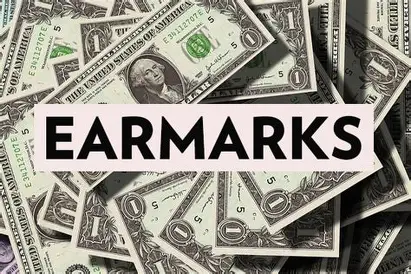 Earmarks reined in, but still prevalent in new budget Earmarks reined in, but still prevalent in new budget
Although legislative earmarks and enhancement grants were reduced in number and scale from recent years, lawmakers were still able to stuff more than 100 pet projects into the fiscal year 2025-26 budget. Members also sought to tout changes in the earmarks process they said increased transparency. The fiscal year 2025-26 budget includes 22 projects within the Department of Labor and Economic Opportunity budget totaling $28 million. A fiscal year 2024-25 supplemental appropriations package included an additional $120 million split between 98 projects. The supplemental also includes seven community enhancement grants, totaling $12.9 million. The House moved first this year to rein in the earmarks practice and increase transparency, changing its rules to require all sponsors to be disclosed for what are commonly known as enhancement grants as well as any co-sponsors if applicable. Nonprofits receiving earmarks would have to have been in existence for three years and had a physical address in the state for at least 12 months On Monday, the Senate adopted a resolution largely mirroring the House rules. House Speaker Matt Hall, R-Richland Township, touted the changes, which he said would become permanent law soon, as the adoption of his HEAT plan – or the Hall, Ethics, Accountability and Transparency plan. Although the House budget sought to cap earmark spending at $100 million, Hall said it was more important to know what the money was being spent on before the budget went up for a vote. "What we want is transparency, which we're accomplishing by HEAT becoming permanent law," he said. "We wanted to force disclosure. We accomplished that, and we cut this pork spending significantly." The boilerplate language in this year's budget also shifts how earmarks work, Hall said. "We've changed this to be reimbursements," Hall said. "They spend the money, and they get reimbursed. I think that'll help a lot." Hall went on to say the earmark transparency measures were why he was willing to shut down the government. "Democrats didn't want to do this," he said. "We took it all the way up to the brink, and then they did it." Rep. Alabas Farhat, D-Dearborn, said he was proud the Legislature brought more transparency to the budget process. "I think it's a good thing that we brough more transparency forward," he said. "I'd love to see more transparency, like FOIA, and even timeline requirements for our budget to be presented." The Senate Appropriations Committee on Thursday held a 30-minute hearing in which a preliminary list of earmark requests was read off by subcommittee chairs. The list was whittled down by the time members voted on the final budget. Sen. Sarah Anthony, D-Lansing, chair of the Senate Appropriations Committee, said during the Thursday hearing that over the previous two years there has been a push to increase transparency regarding the grants. This included language in the fiscal year 2023-24 budget to begin requiring letters of sponsorship of earmark requests to be provided and be made publicly available. Anthony acknowledged that for this budget cycle, the road funding plan that passed was a key area of focus. "I think a lot of our revenue, a lot of our funding, went towards roads, and seeing how much went towards local infrastructure, I think ultimately, was the tradeoff for those earmarks and local projects," Anthony said. Two projects, one for flood mitigation in Midland and the other a road project in Trenton, were the largest grants in the supplemental, at $10 million apiece. The next largest grant was $9.8 million for a dam restoration project through the Four Lakes Task Force, which oversees the maintenance and operations of the Second, Smallwood, Edenville and Sanford dams. Local roads and infrastructure projects made up many more grants – from road repairs in Davison ($4.4 million), bridge repairs in Sheridan Township ($3.3 million), the Marquette Sawyer Regional Airport ($3 million), lead service line replacements in Mount Clemens ($3 million), enhancements along the Nautical Mile in Saint Clair Shores ($1 million), and a rail grade separation in Monroe ($500,000). Several requests were granted to local law enforcement agencies and first responders for equipment including vehicles and equipment as well as items including for the Michigan Professional Fire Fighters Union's training seminar ($1.2 million), the Department of State Police for local law enforcement personal protection orders reimbursements ($1 million), tasers for police in Calhoun County ($737,000) for police body cameras in Albion ($32,000) Funding for arts and entertainment projects were included, such as the Grand Rapids Art Museum ($2 million), the Schaap Performing Arts Center in Grosse Pointe Park ($1.7 million), a railroad museum in Durand ($1 million), the Concert of Colors festival in Detroit ($1 million) and the Ypsilanti Historical Society ($140,000). Grants earmarked throughout the budget began growing in number since 2018, and in recent years have totaled billions of dollars. Concerns have been raised during the past few years over who requested specific funds and for what intended recipient. In multiple instances there have been examples of potential conflicts and in using monies for unrelated items.
The changes in the Department of Health and Human Services budget for the 2025-26 fiscal year in Medicaid are dramatic, but more from a structure standpoint, not a short-term funding standpoint. On the surface, the 20.2%reduction to the department – $7.62 billion – seems stunning. And it is. But the budget creates new boilerplate contingency funds holding $9.3 billion of those funds. At issue are the provisions in the federal One Big Beautiful Bill Act that curb or prohibit the type of provider taxes Michigan and other states have long used to draw more federal funds for Medicaid. Of worry is the Michigan Insurance Provider Assessment, paid by the state's Medicaid health plans. It is not expected to survive review by the U.S. Center for Medicare and Medicaid Services. The hospital Quality Assurance Assessment Program, also known as the "bed tax," also faces problems. Should those funding mechanisms end, the state's Medicaid coverage would face major reductions. In the past week, the state has unfurled a two-part response to this potential crisis. First, the Legislature has passed HB 4968 , which does two things. It amounts to a "pretty please" request to the federal government to provide the state with a transition period allowing the provider taxes time to remain in place while the state determines a replacement. And it provides unilateral authority to the executive branch to devise a new funding scheme if the federal government spikes the state's funding mechanisms. Second is the appropriations in the general omnibus bill, HB 4706 . New contingency language was added in the DHHS budget's boilerplate reappropriating the removed $9 billion and setting up contingency authorizations of $9.3 billion. These contingency funds, in essence, allow the state to prepare for the loss of funding. The boilerplate allows the state to spend the moneys as long as they are available. Dominick Pallone, executive director of the Michigan Association of Health Plans, said his members are pleased with the approach. "At first blush, as you're looking at the Part I numbers that are in there for line items, if you look at that alone, that would be scary," he said. "We're comfortable for the way in which it's formed right now." Pallone said his read is that while the funds are held in contingency, DHHS has freedom to spend them, provided the money is there. The budget, combined with the boilerplate, is clearly designed to persuade the federal government to provide the state with transition time. "Please federal government give us the transition because if you don't, our program is devastated," Pallone said in summarizing the message. Insurers do have some concerns about HB 4968 providing the executive branch with total authority to design a replacement funding mechanism if needed. The answer cannot be to simply tax the insurers to replace the funds, he said. There were reductions in full-time equivalent employees following House Republicans – 270 unfunded FTEs in the Children's Services Agency, 212 unfunded across administrative support, and other areas, 388 unfunded FTEs from state psychiatric hospitals and 7 fewer FTEs in child support enforcement operations. The overall FTE reduction was 827, or 5.2 percent. Several items Gov. Gretchen Whitmer proposed did not make the cut: $24.4 million for Kinship Support Services; $13.3 million for foster home parent recruitment and other foster care services; $17.5 million for adoption support; $12.8 million for juvenile justice operations was reduced to $2.2 million; $25 million in one-time funding for energy assistance to low-income residents ($50 million was added though instead of the $75 million Whitmer proposed); $22.9 million for tobacco prevention and smoking cessation; $96.4 million ($33.1 million General Fund) to detach the Medicaid protected income level from the Family Independence Program standard that would have protected more people from having to spend down income; and $14 million ($6.2 million General Fund) for a $0.85 per hour wage increase for nonclinical staff employed in skilled nursing facilities. Whitmer did get the $39.3 million ($6.3 million General Fund) she requested for certified community behavioral health clinics. The House version of the budget had cut $333.5 million federal in the food assistance program, citing a payment error rate of 9.53%. The budget did not include that reduction. Another big House change, transferring funding for six Medicaid pre-paid inpatient health plans to one time, was ditched. The final budget added $30 million ($15 million General Fund) for food assistance program reinvestment. It also greatly expanded spending to combat opioid abuse prevention and treatment, by $83.5 million to $131.8 million. The House and Senate had both pushed for far more than Whitmer recommended. The budget process saw some clashing between House Speaker Matt Hall, R-Richland Township, and the state's hospitals. But Brian Peters, CEO of the Michigan Health and Hospital Association, praised the budget and Hall. "Michigan's elected officials demonstrated today a strong, bipartisan commitment to protecting healthcare funding in the state budget," he said in a statement. "We thank all of those who worked together when it mattered most, especially Gov. Whitmer, Senate Majority Leader Brinks and Speaker of the House Hall for their leadership in agreeing to a budget that will continue to advance the health of individuals and communities throughout the state. Hospitals, health care workers and patients have secure state funding for another year, maintaining access to care and protecting important service lines." DCD AT MACKINAC GOP LEADERSHIP CONFERENCE: 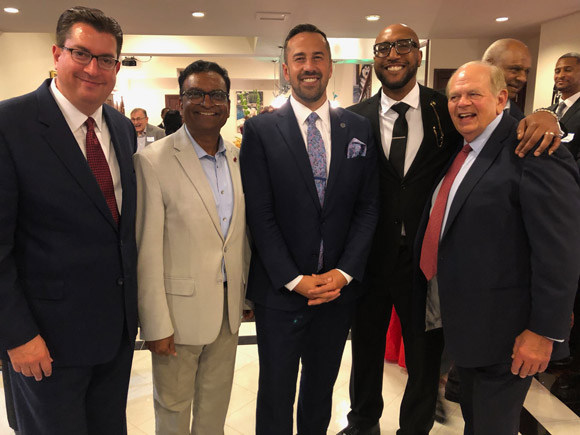
Senator Mat and Jake German had an excellent time supporting Mike McGuinness at an event co-hosted in his honor at the home of DCD client and Lakeshore Global President, Avinash Rachmale, alongside Pontiac Housing Commission Director Ahmad Taylor, also a client of DCD. Ahmad and Avinash did a great job putting together an excellent event for Mike! 
Senator Mat and Jake German had a terrific time attending Honor Community Health's "Gatsby Gala" at the historic Lafayette Grand in Pontiac. It was great to spend time with Deb Brinson, CEO of Honor Community Health, Mr. Mike McGuinness, and Honor Board President, Michael Yocum. DCD IS A FULL-SERVICE, BI-PARTISAN, MULTI-CLIENT LOBBYING FIRM REMEMBER ALL OF DCD'S SERVICES: ARTICLES OF POLITICAL INTEREST:
10-digit dialing required in Detroit as 679 joins iconic 313 area code Michigan legislators kill Gretchen Whitmer’s $2B cash-for-jobs program Winners and Losers in Michigan’s $81 Billion Budget Michigan lawmakers react to first federal shutdown in seven years amid funding stalemate GOP bill would force Michigan school board candidates to state their party affiliation Marijuana News, Updates, & Articles of Interest
We are here to help you with: municipal lobbying, license application writing and assistance, business plans, state required operations manuals and compliance, facility design, corporate structure, and design and branding. We are experts in both medical and recreational cannabis policy and have been in the space for over ten years. We welcome any opportunity to work with you in the future! ARTICLES OF CANNABIS INTEREST: As Michigan marijuana tax jumps to 40%, critics worry it’ll fuel black market China’s black-market marijuana ‘tentacles’ have reached Michigan Cannabis industry advocates, lawmakers say 24% tax on Michigan marijuana is too high Michigan Marijuana Industry Group Considers Lawsuit Against Tax Hike Advancing In Legislature Doing Things Differently DCD is rebranding, and our bottom line is your bottom line. We are striving to create and foster strong relationships with clients and lawmakers, deliver results with strong ethics and class, but above all else, out-hustle and out-smart our competition every day to be the very best. We’re making chess moves while others are playing checkers. Everything we do is with you in mind, we’re doing things we’ve never done before and aggressively pursuing opportunities. The time is now. DCD has taken our firm to the next level and your involvement and investment paired with our knowledge and expertise is going to launch the great state of Michigan forward. |
|||||||
|
|||||||

Contact Us
Address
Phone
Copyright © Dunaskiss Consulting and Development Inc.


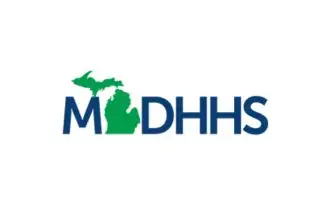 Restructured DHHS budget seen as preparing for federal changes
Restructured DHHS budget seen as preparing for federal changes THE DCD MARIJUANA TEAM: YOUR COMPETITIVE EDGE!
THE DCD MARIJUANA TEAM: YOUR COMPETITIVE EDGE!